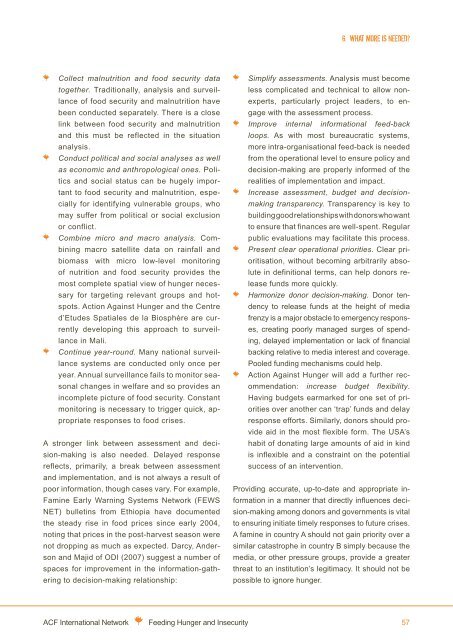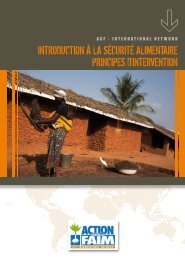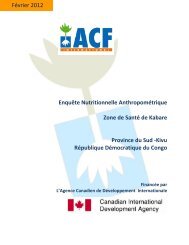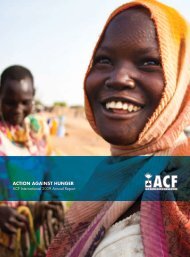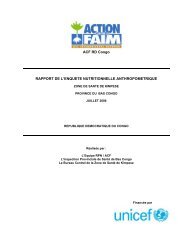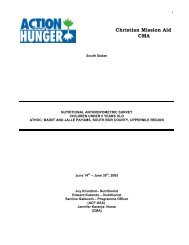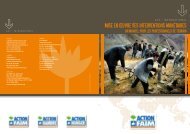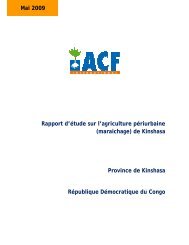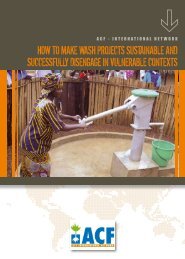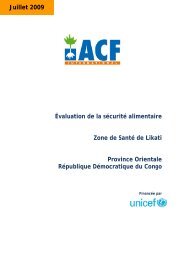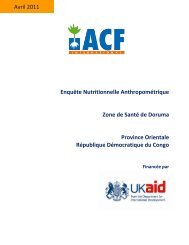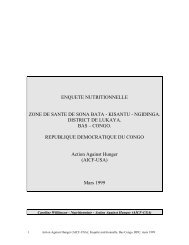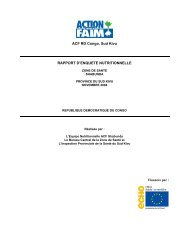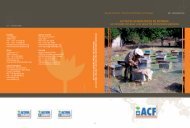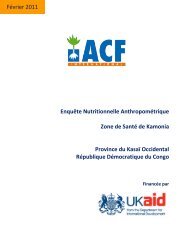Feeding hunger and insecurity
Feeding hunger and insecurity
Feeding hunger and insecurity
- No tags were found...
Create successful ePaper yourself
Turn your PDF publications into a flip-book with our unique Google optimized e-Paper software.
6. what more is needed?Collect malnutrition <strong>and</strong> food security datatogether. Traditionally, analysis <strong>and</strong> surveillanceof food security <strong>and</strong> malnutrition havebeen conducted separately. There is a closelink between food security <strong>and</strong> malnutrition<strong>and</strong> this must be reflected in the situationanalysis.Conduct political <strong>and</strong> social analyses as wellas economic <strong>and</strong> anthropological ones. Politics<strong>and</strong> social status can be hugely importantto food security <strong>and</strong> malnutrition, especiallyfor identifying vulnerable groups, whomay suffer from political or social exclusionor conflict.Combine micro <strong>and</strong> macro analysis. Combiningmacro satellite data on rainfall <strong>and</strong>biomass with micro low-level monitoringof nutrition <strong>and</strong> food security provides themost complete spatial view of <strong>hunger</strong> necessaryfor targeting relevant groups <strong>and</strong> hotspots.Action Against Hunger <strong>and</strong> the Centred’Etudes Spatiales de la Biosphère are currentlydeveloping this approach to surveillancein Mali.Continue year-round. Many national surveillancesystems are conducted only once peryear. Annual surveillance fails to monitor seasonalchanges in welfare <strong>and</strong> so provides anincomplete picture of food security. Constantmonitoring is necessary to trigger quick, appropriateresponses to food crises.A stronger link between assessment <strong>and</strong> decision-makingis also needed. Delayed responsereflects, primarily, a break between assessment<strong>and</strong> implementation, <strong>and</strong> is not always a result ofpoor information, though cases vary. For example,Famine Early Warning Systems Network (FEWSNET) bulletins from Ethiopia have documentedthe steady rise in food prices since early 2004,noting that prices in the post-harvest season werenot dropping as much as expected. Darcy, Anderson<strong>and</strong> Majid of ODI (2007) suggest a number ofspaces for improvement in the information-gatheringto decision-making relationship:Simplify assessments. Analysis must becomeless complicated <strong>and</strong> technical to allow nonexperts,particularly project leaders, to engagewith the assessment process.Improve internal informational feed-backloops. As with most bureaucratic systems,more intra-organisational feed-back is neededfrom the operational level to ensure policy <strong>and</strong>decision-making are properly informed of therealities of implementation <strong>and</strong> impact.Increase assessment, budget <strong>and</strong> decisionmakingtransparency. Transparency is key tobuilding good relationships with donors who wantto ensure that finances are well-spent. Regularpublic evaluations may facilitate this process.Present clear operational priorities. Clear prioritisation,without becoming arbitrarily absolutein definitional terms, can help donors releasefunds more quickly.Harmonize donor decision-making. Donor tendencyto release funds at the height of mediafrenzy is a major obstacle to emergency responses,creating poorly managed surges of spending,delayed implementation or lack of financialbacking relative to media interest <strong>and</strong> coverage.Pooled funding mechanisms could help.Action Against Hunger will add a further recommendation:increase budget flexibility.Having budgets earmarked for one set of prioritiesover another can ‘trap’ funds <strong>and</strong> delayresponse efforts. Similarly, donors should provideaid in the most flexible form. The USA’shabit of donating large amounts of aid in kindis inflexible <strong>and</strong> a constraint on the potentialsuccess of an intervention.Providing accurate, up-to-date <strong>and</strong> appropriate informationin a manner that directly influences decision-makingamong donors <strong>and</strong> governments is vitalto ensuring initiate timely responses to future crises.A famine in country A should not gain priority over asimilar catastrophe in country B simply because themedia, or other pressure groups, provide a greaterthreat to an institution’s legitimacy. It should not bepossible to ignore <strong>hunger</strong>.ACF International Network <strong>Feeding</strong> Hunger <strong>and</strong> Insecurity 57


